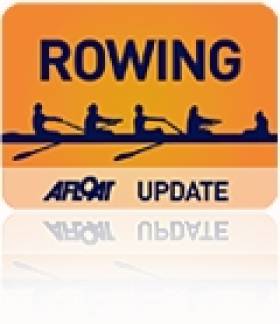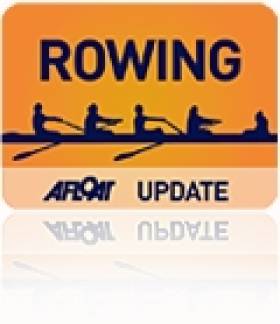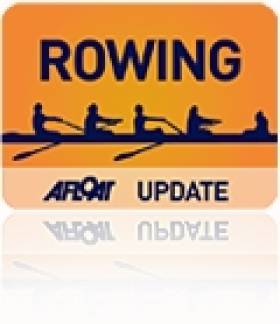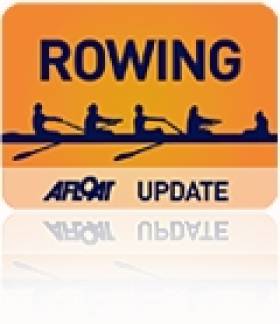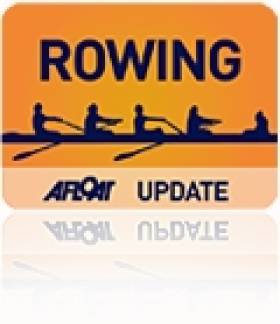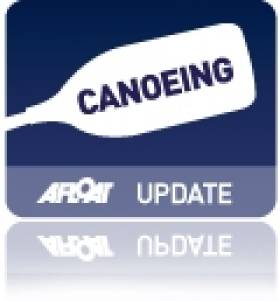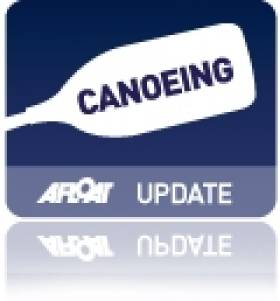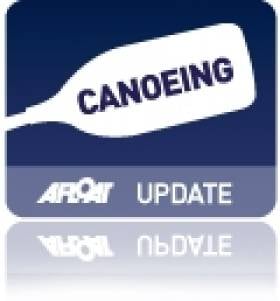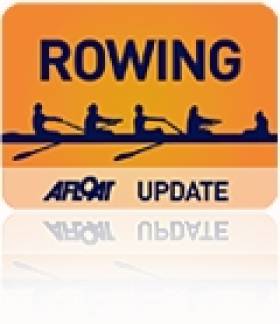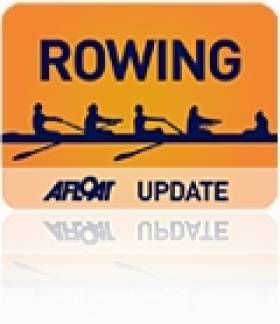Displaying items by tag: European Championships
Puspure Puts Ireland in European Rowing Semi-Finals
#ROWING: Sanita Puspure won her repechage at the European Rowing Championships in Belgrade in Serbia today to qualify for tomorrow’s semi-finals of the women’s single sculls. Puspure could have finished in any of the top three places and qualified, but she made the race her own and won convincingly. Behind her there was a battle for second and third, with Denmark and Latvia making it.
European Rowing Championships, Belgrade, Serbia – Day One (Irish interest; selected results)
Men
Lightweight Single Sculls – Heat Three (First Two to A/B Semi-Finals; rest to Repechage): 1 Italy (M Miani) 6:56.92, 2 Bulgaria (N Vasilev) 6:59.35; 3 Ireland (P O’Donovan) 7:02.21, 4 France 7:06.95, 5 Turkey 7:16.58. Repechage (First Two to A/B Semi-Finals; rest to C/D Semi-Finals): 1 Slovenia (R Hrvat) 7:06.58, 2 Serbia (M Stanojevic) 7:09.01; 3 Czech Republic 7:11.62, 4 Ireland (O’Donovan) 7:12.26, 5 Netherlands 7:15.5.
Women
Pair – Heat Two (Winner to A Final; rest to Repechage): 1 Romania (C Grigoras, L Oprea) 7:14.51; 2 Ireland (L Kennedy, L Dilleen) 7:18.77, 3 Croatia 7:21.87, 4 Serbia 7:24.46, 5 Germany 7:32.40.
Double Sculls – Heat Two (First Two to A Final; rest to Repechage): 1 Poland (M Fularczyk, N Madaj) 6:46.50, 2 Britain (F Houghton, V Thornley); 3 Netherlands 6:54.59, 4 Czech Republic 7:10.63, 5 Ireland (M Dukarska, E Moran) 7:16.66.
Single Sculls – Heat Three (First Two to A/B Semi-Finals; rest to Repechage): 1 Czech Republic (M Knapkova) 7:29.98, 2 Netherlands (C Acterberg) 7:31.64; 3 Ireland (S Puspure) 7:39.26, 4 Sweden 7:48.13, 5 Latvia 7:51.24. Repechage Two (First Three to A/B Semi-Finals; rest to C Final): 1 Ireland (Puspure) 7:43.41, 2 Denmark (L Jakobsen) 7:46.03, 3 Latvia (E Gulbe) 7:46.75; 4 Bulgaria 7:48.05, 5 Estonia 7:53.49, 6 Norway 7:58.91.
Tough Second Outing For O'Donovan At European Rowing
#ROWING: Paul O’Donovan, who came within one place of gaining automatic qualification for the A/B semi-finals this morning, could only finish fourth in his repechage at the European Rowing Championships in Belgrade in Serbia this afternoon. The two coveted places in the lightweight single sculls semis went to Slovenia and Serbia. The Czech Republic was third and Ireland fourth. O’Donovan’s next challenge is the C/D semi-finals tomorrow.
European Rowing Championships, Belgrade, Serbia – Day One (Irish interest; selected results)
Men
Lightweight Single Sculls – Heat Three (First Two to A/B Semi-Finals; rest to Repechage): 1 Italy (M Miani) 6:56.92, 2 Bulgaria (N Vasilev) 6:59.35; 3 Ireland (P O’Donovan) 7:02.21, 4 France 7:06.95, 5 Turkey 7:16.58. Repechage (First Two to A/B Semi-Finals; rest to C/D Semi-Finals): 1 Slovenia (R Hrvat) 7:06.58, 2 Serbia (M Stanojevic) 7:09.01; 3 Czech Republic 7:11.62, 4 Ireland (O’Donovan) 7:12.26, 5 Netherlands 7:15.5.
Women
Pair – Heat Two (Winner to A Final; rest to Repechage): 1 Romania (C Grigoras, L Oprea) 7:14.51; 2 Ireland (L Kennedy, L Dilleen) 7:18.77, 3 Croatia 7:21.87, 4 Serbia 7:24.46, 5 Germany 7:32.40.
Double Sculls – Heat Two (First Two to A Final; rest to Repechage): 1 Poland (M Fularczyk, N Madaj) 6:46.50, 2 Britain (F Houghton, V Thornley); 3 Netherlands 6:54.59, 4 Czech Republic 7:10.63, 5 Ireland (M Dukarska, E Moran) 7:16.66.
Single Sculls – Heat Three (First Two to A/B Semi-Finals; rest to Repechage): 1 Czech Republic (M Knapkova) 7:29.98, 2 Netherlands (C Acterberg) 7:31.64; 3 Ireland (S Puspure) 7:39.26, 4 Sweden 7:48.13, 5 Latvia 7:51.24.
Dilleen and Kennedy Second in European Heat
#ROWING: All four Ireland crews are set for repechages after today's first session of heats at the European Rowing Championships in Belgrade in Serbia. The women’s pair of Leonora Kennedy and Lisa Dilleen came a creditable second to Romania in their heat, but only one automatic qualification place was on offer. Women’s single sculler Sanita Puspure also finished just one place off qualification, in third, in a race won by Olympic champion Mirka Knapkova. The Ireland women’s double of Monika Dukarska and Eimear Moran were fifth in their heat.
Earlier, Paul O’Donovan had finished third in his heat of the lightweight single sculls.
European Rowing Championships, Belgrade, Serbia – Day One (Irish interest; selected results)
Men
Lightweight Single Sculls – Heat Three (First Two to A/B Semi-Finals; rest to Repechage): 1 Italy (M Miani) 6:56.92, 2 Bulgaria (N Vasilev) 6:59.35; 3 Ireland (P O’Donovan) 7:02.21, 4 France 7:06.95, 5 Turkey 7:16.58.
Women
Pair – Heat Two (Winner to A Final; rest to Repechage): 1 Romania (C Grigoras, L Oprea) 7:14.51; 2 Ireland (L Kennedy, L Dilleen) 7:18.77, 3 Croatia 7:21.87, 4 Serbia 7:24.46, 5 Germany 7:32.40.
Double Sculls – Heat Two (First Two to A Final; rest to Repechage): 1 Poland (M Fularczyk, N Madaj) 6:46.50, 2 Britain (F Houghton, V Thornley); 3 Netherlands 6:54.59, 4 Czech Republic 7:10.63, 5 Ireland (M Dukarska, E Moran) 7:16.66.
Single Sculls – Heat Three (First Two to A/B Semi-Finals; rest to Repechage): 1 Czech Republic (M Knapkova) 7:29.98, 2 Netherlands (C Acterberg) 7:31.64; 3 Ireland (S Puspure) 7:39.26, 4 Sweden 7:48.13, 5 Latvia 7:51.24.
O'Donovan Third in Heat at European Rowing Championships
#ROWING: Paul O’Donovan finished third in his heat of the lightweight single sculls, just one place outside automatic qualification for the A/B semi-finals, at the European Championships in Belgrade this morning. In fast cross-tailwind conditions, Italy’s Marcello Miani set a hot pace and won well. France, Bulgaria and Ireland vied for the valuable second spot. O'Donovan put in a good second 1,000 metres, but Bulgaria’s Nedelcho Vasilev took second. France were fourth. Ireland, France and Turkey go to Repechages later in the day.
European Rowing Championships, Belgrade, Serbia – Day One (Irish interest; selected results)
Men
Lightweight Single Sculls – Heat Three (First Two to A/B Semi-Finals; rest to Repechage): 1 Italy (M Miani) 6:56.92, 2 Bulgaria (N Vasilev) 6:59.35; 3 Ireland (P O’Donovan) 7:02.21, 4 France 7:06.95, 5 Turkey 7:16.58.
#ROWING: A team of seven athletes have been selected to represent Ireland at the European Junior Rowing Championships in Hazelwinkel, Belgium on May 24th and 25th. This is the first time Rowing Ireland has sent a team to compete at this event.
The team is:
Junior Women’s Single Scull: Erin Barry, Bann RC.
Junior Women’s Double Scull: Eimear Lambe, Commercial RC and Jasmine English, Belfast BC
Junior Men’s Double Scull: David O’Malley, St Michaels RC and Conor Carmody, Shannon RC
Junior Men’s Pair: David Keohane and Brian Keohane, Presentation College RC
All seven athletes represented Ireland in 2013. Erin Barry, Jasmine English, David O’Malley and Conor Carmody competed at the Junior World Rowing Championships, while Eimear Lambe, David Keohane and Brian Keohane were chosen for the Coupe de la Jeunesse, a European tournament. This year’s World Junior Rowing Championships and Coupe de la Jeunesse both take place in August.
Laois Teen Makes Freestyle Kayaking Team For Euros
#Kayaking - Laois teenager Calvin O'Brien is one of the latest to qualify for the junior men's freestyle kayaking team headed to the European Championships in Slovakia this September.
As the Leinster Express reports, the 17-year-old claimed his spot by showing off his moves in the tough proving ground of a whitewater kayaking tournament in Tuam, Co Galway recently.
And he continues a long line of success for the Laois Kayak & Canoe Club, which has members competing at national level in canoe marathons and canoe polo.
The Leinster Express has more on the story HERE.
Craig Comes Close in Canoe Slalom Championships
# EURO CANOE SLALOM: Hannah Craig finished 17th of the 40 competitors in the women’s K1 at the European Canoe Slalom Championships in Krakow in Poland today. The Ireland Olympian clocked 99.82 seconds in the heat, which put her just 1.01 seconds behind the 10th place finisher who secured a slot in the final. Aisling Conlan was given three 50-second penalties and finished 40th.
Canoe Slalom European Championships, Krakow, Poland, Day Two (Irish interest)
Women – K1 Heat (First 10 to Final): 1 Britain (F Pennie) 92.01; 17 H Craig 99.82; 40 A Conlan 274.24 (122.24 plus 152 sec penalties).
Heurteau and Rheinisch Miss Out in One-Shot Heat
# EURO CANOE SLALOM: Ireland’s two competitors in the men’s K1 (racing kayak) at the European Canoe Slalom Championships in Krakow in Poland today came up short of making the final. The programme had to be radically altered because of the recent flooding and only the first 15 of 57 in a single run made it to the final. Ciaran Heurteau was ajudged to have missed the 15th gate and the resulting 50-second penalty ruled him out. However, Eoin Rheinisch was originally in the hunt, initially placing 8th after clocking 91.54 seconds including a two-second penalty for hitting gate 19. But that penalty was upped to 50 seconds and he finished 46th, with Heurteau 47th. Rheinisch’s original run would not have made it in any case as the competitors coming after him pushed him down the field.
Canoe Slalom European Championships, Krakow, Poland, Day One (Irish interest)
Men
K1 Heat One (First 15 to Final): 1 Czech Republic (V Hradilek) 82.96; 46 E Rheinisch 139.54 (89.54 plus 50 sec penalty); 47 C Heurteau 140.20 (86.20 plus 54 sec penalties).
Lambe Just One Place From Medal in European Rowing Final
# ROWING: Ireland’s Claire Lambe finished fourth in the A Final of the lightweight single sculls at the European Rowing Championships in Seville this morning.
Raced into a strong headwind this was an interesting contest. At the head of the field Greek tyro Alkaterini Nikolaidou moved up alongside multi-medal winner Michaela Taupe-Traer in the middle stages of the race and then took off at 1500 metres to win gold, with the Austrian having to settle for silver. Lambe was fourth behind Marie-Anne Frenken of the Netherlands all down the course and could not make up the deficit in the final quarter to move into the medal places.
European Championships, Day Three (Irish interest)
Women
Lightweight Single Sculls – A Final: 1 Greece (A Nikolaidou) 8:32.92, 2 Austria (M Taupe-Traer) 8:36.59, 3 Netherlands (M-A Frenken) 8:39.14; 4 Ireland (C Lambe) 8:47.66, 5 Italy 8:50.74, 6 Cyprus 9:01.25.
Puspure Withdraws From European Rowing Semi-Final
# ROWING: Sanita Puspure was withdrawn from the A/B semi-final of the single sculls at the European Rowing Championships in Seville today. Ireland Performance Director, Morten Espersen said that the decision was made this morning because the 31-year-old had flu-like symptoms. Puspure was very unwell and could not race.
John Keohane finished fifth in his C Final, 17th overall, while the Ireland lightweight double of Niall Kenny and Justin Ryan finished 21st overall with third pace in the D Final behind Slovakia and the Czech Republic. In the C/D semi-final they were competitive early but lost out when the second half of the race became a scramble for second and third places behind dominant winners Hungary. Ireland struggled to deal with the head wind and finished fifth.
European Rowing Championships, Seville, Day Two (Irish interest)
Men
Single Sculls – C Final (places 13 to 18): 1 Hungary 7:56.08; 5 Ireland (J Keohane) 8:03.54.
Lightweight Double Sculls – C/D Semi-Finals Two (First Three to C Final; rest to D Final): 1 Hungary 7:15.12, 2 Slovenia 7:18.43, 3 Bulgaria 7:18.64; 4 Slovakia 7:20.27, 5 Ireland (N Kenny, J Ryan) 7:26.76. D Final (places 19 to 22): 1 Slovakia 7:20.10, 2 Czech Republic 7:20.44, 3 Ireland 7:25.26, 4 Armenia 8:59.40.
Women
Single Sculls – A/B Semi-Final One: Ireland (S Puspure) Did not start.



























